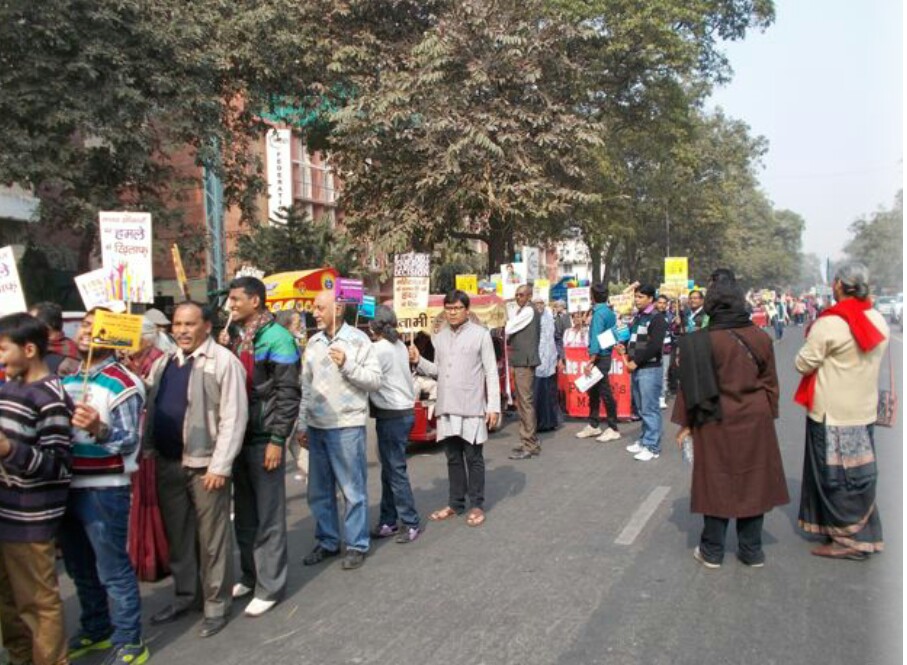The March of the People: Wanted! A New Political Order
The Peoples March for the Republic;

They came from all over Delhi and some from the neighbouring region---the farmers, the students, the Dalits, the Queers, the Disabled, the Muslims, the Christian, the activists, the odd politician, the academics, the human rights workers, the lawyers---to March for the Republic.
Rarely have Delhi streets seen this kind of diversity, of different groups who have for the first time come together to face the challenge to India’s Republic, walking behind one banner, hundreds of placards raising the issues affecting the people of India, singing, shouting slogans as they marched from Mandi House to Jantar Mantar to raise their voice against the regime. Against communalism, against authoritarianism, against casteism, against violation of human rights, against repressive police rule--- for secularism, for land rights, for gender empowerment, for queer rights, for the farmers, for the disabled, for equal opportunities, for the right to live, to work, to breathe.
It was all there, a huge banner for Rohith Vemula, the student who gave his life in Hyderabad Central University symbolising the struggle against discrimination even as the government and the authorities have let loose a slander campaign against him, and against what he represents. The enthusiasm was huge, the representation wide,but the before and the after became a reminder of the odds that civil society is up against, even as the March itself threw up a new characterestic that bodes well for the future.
To begin with the plus: it was clear that civil society, a term generally used to describe non-government efforts and in the Indian context often placed counter to the government, has acquired an increasingly political profile. The political mealy mouthedness that often defined activist work on the ground, where the attitude was “we are just working in the villages, we cannot bothered with politics” has shifted substantially in the realisation that activism cannot be but political. And that the issues today are larger than the village, or the community groups work with, and that freedom and equality even in that little space is dependent and linked to the larger political democratic space. And that the one is not possible without the other, so the ostrich approach is a cop out, and certainly does not work.
This realisation was visible in the coming together of the groups, many of whom have not differed with each other on trivial issues in the past, and the political nature of the March where the slogans were not just about rozi, roti and rights for specific groups, but a far broader approach linked to the new understanding that communalism, casteism, empowerment cannot be segregated in different boxes and constitute a big whole. Civil society has clearly evolved, and as the March demonstrated, the last couple of years have served as a major learning experience for all.
Except some of the political parties who remain caught in the old structures, and have lost their flexibility of approach long ago. Instead of ensuring a mix of mass organisations---such as their women, students, trade unions---with the March, these political parties were more set on laying out conditions. For the CPI(M), there was no question of marching if the civil society organisers were going to invite the Congress party. But what about the fact that you are working with the Congress in Parliament, talking to it in West Bengal, here it is only a March without flags and banners? The CPI(M) remained deaf, and insisted it would not be there if the Congress mass organisations were invited.
As for the Congress, it cannot do anything without its political leaders being present and in the lead. So that was the response from that end. And the regional parties along with the rest have to realise that just by replacing the fathers with the sons, does not make for ‘new’ but only reinforces the control of the old.
By then the organising committee, in consultation with all the groups, had taken a decision. The invitation is all inclusive, without conditions. Come if you want to, stay at home as you have come pretty good at doing if that is the alternative that seems more attractive. Also no political leaders, as no political speeches as per the unanimous decision by the groups. The result was that it became a people’s march, with the enthusiasm that only ordinary citizens charged with a conscience can bring with them.
For those who cared to look, the first glimpse of a new writing on the wall was visible. The March was challenging the status quo, and calling out for a new order. A new political order, progressive, democratic, determined, young, to face the new challenges. The old, tired, stuck-in-the-groove approach cannot provide the edge so desperately needed to cut into what is fast being cemented as a wall of divisiveness and hate.

